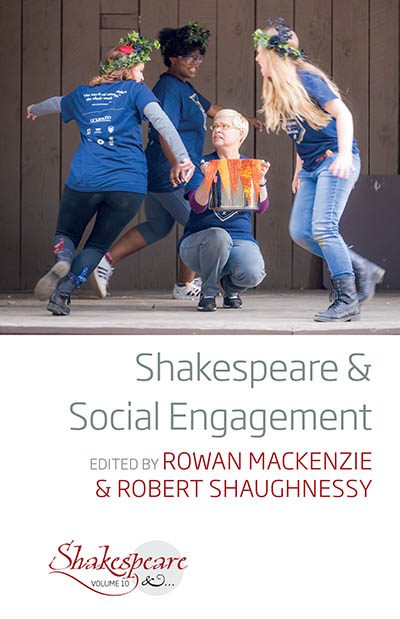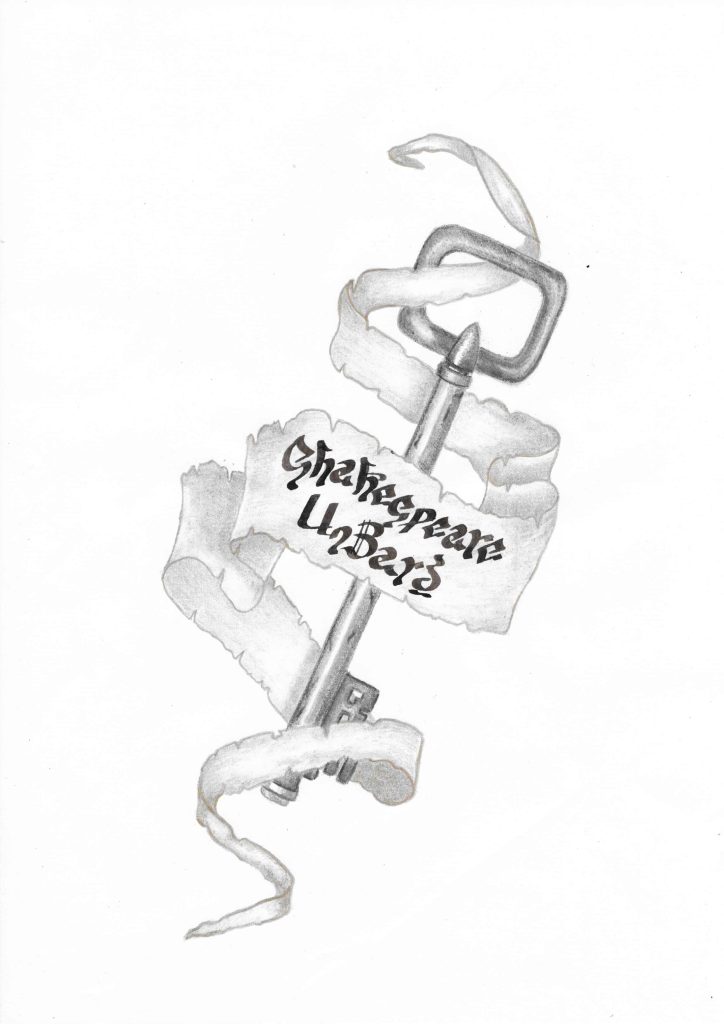Rowan Mackenzie, co-editor of ‘Shakespeare and Social Engagement‘ takes us through the development of the latest book in our Shakespeare & series, her focus on practice-based research and what this collected volume reveals.
Hi Rowan it’s good to speak to you, could you start off by telling us more about your work and research up to this point in your career?
I completed a PhD in Creating Space for Shakespeare with marginalised communities in 2021; which included working with people in prison, people with mental health issues, neuro-diverse people and those with lived experience of homelessness. I have been involved with projects around the world including being the Shakespeare Consultant for Blue Apple Theatre and also established a number of collaborative theatre companies in prisons (which is the work I continue to do today), all underpinned by trauma-informed pedagogies. I’ve published a monograph on my work and also several chapters and articles, including some co-written with serving prisoners.
Could you tell us more about your work as founder and Artistic Director of Shakespeare UnBard and Co-Chair of the Shakespeare Beyond Borders Alliance?
The Shakespeare Beyond Borders Alliance (@BordersAlliance) was co-founded by Professor Michael Dobson, Dr Chris Laoutaris and myself, and is hosted by the Shakespeare Institute. The intention was to create a global network of practitioners, academics and participants who use Shakespeare as a way of bridging divides, removing barriers and building equality. Our launch event in June 2021 saw over 600 people join us for conversations, panel discussions and performances and last year we hosted the Equality Shakespeare Festival which brought together even more voices from around the globe, including a panel of Ukrainian scholars. Our plans for a global Shakespeare event in November 2023 are progressing well.
Shakespeare UnBard (@bard_un) is the organisation I founded which facilitates drama workshops and theatre companies in a number of English prisons. The theatre companies are collectively owned between myself and up to 15 prisoners with all decisions made democratically as the participants are given the mental freedom to develop ‘positive autonomy’ as we work together to put on full-length Shakespeare productions.
How has such a strong variety of practice-based work influenced your research?
My research has always been practice-based and in this regard I was influenced by James Thompson’s wise words to be ‘a practitioner who writes not a theoretician who practices’ (Thompson, James, 2005 Digging Up Stories: Applied Theatre, Performance and War (Manchester: Manchester University Press) p.8). I have been fortunate to have built up a great network of national and international contacts who work in applied theatre, as well as facilitating projects myself in 8 prisons. This has enabled me to gather significant qualitative and quantitative data, anecdotal feedback and self-assessment, sometimes over periods of years; giving my research a long-term ethnographic basis which is not commonly found in applied theatre studies.
How did you meet your co-editor Robert Shaughnessy? How has it been working on this collection together?
Robert and I met at a Flute Theatre production of The Tempest in 2016 and began a conversation about our shared interest in Kelly Hunter’s innovative work for children with autism. This developed into two symposiums on Applied Shakespeare which we co-organised (the first hosted by the Shakespeare Institute and the second by Guildford School of Acting). These in turn gave rise to the special edition of Critical Survey which we co-edited.
Can you explain a bit of the process of altering the special edition of Critical Survey into its own volume?
Between the special edition and being asked to develop this into a volume in the Shakespeare & series the world had altered irrevocably due to the Covid-19 pandemic, the impact of Brexit, the cost of living crisis and a number of socio-political developments. Many of these had significant impacts on the arts sector and so the process of turning this into an edited collection gave us the opportunity to invite our authors to update their chapters to take account of this new landscape, as well as adding two additional chapters and an afterword which have helped to broaden out the collection in exciting new ways.
Could you tell me more about some of the groups and projects you have included in this collection? How have they shaped your research findings?
The focus in this edited collection is on Shakespeare in socially engaged contexts, often with specialised communities. There is a growing interest in applied theatre but much of the research is completed in silos which focuses on a specific marginalised group; here we aim to bring together a range of groups who may initially seem to have little in common but where actually the themes of marginalisation have important read-across to other projects both within this book and beyond. The projects included range from post war peace-building to accessibility for d/Deaf children, from theatre in forensic settings to highlighting the impacts of climate change; a diverse and richly varied selection of the ways in which Shakespeare’s cultural capital can be inverted to give voice to those often excluded from important sociological conversations.
And why was it important for you to include audiences that have previously been largely excluded from accounts of Shakespeare’s performance history in this collection
Applied theatre is not a new concept, although it has grown in focus over recent decades, but much of the work is ephemeral with limited information captured about so many of the tremendous projects which bring Shakespeare to those who may traditionally be excluded from such works. It is only by examining these programmes, from the perspectives of academics, practitioners and participants that we are able to understand the ways in which Shakespeare may be used as a tool of communication rather than of oppression (as has so often been the case in the past).
Why do you think Shakespeare has such significance as a form of social engagement and performance in such diverse groups?
The cultural capital of Shakespeare is a double-edged sword: it has often been used as a tool of exclusion but it can also be used as a way of encouraging dialogue which brings together disparate groups into a cohesive whole with a greater shared understanding. Shakespeare is not a panacea, it should not be seen as some gift to be bestowed on marginalised communities as though the attainment of Shakespeare somehow validates their existence and journey. However, when used appropriately and sensitively it can help people to find a voice where they struggled to articulate their point of view or to have it listened to previously. The same cultural capital which can be divisive can also be a powerful tool in bridging divides when used authentically and as a combination of Shakespeare’s work and the lived experiences of those engaging with it
In light of this, who do you think will benefit from reading this book?
This book will be of interest to practitioners, actors and undergraduate and postgraduate students of drama, theatre, applied theatre and literature as it prompts the reader to think more widely than the traditional view of Shakespeare as a bastion of the cultural cannon and to consider how it may be edited, adapted and owned by people from a wide range of backgrounds, experiences and abilities. My hope would be that it inspires conversations, interest and activity in socially engaged theatre – a field which continues to develop and which is fundamental to our humanity.
Finally, what are you working on now? Where has your research taken you since editing this collection?
My work continues to be focused on those serving custodial sentences, many of whom also have mental health issues, neuro-diversity, substance misuse issues and experiences of homelessness (a people-centric approach looks at the person rather than isolating their reason for marginalisation) and I am currently working permanently in four prisons as well as working on further publications, including developing the concept of co-authorship with both prisoners and prison governors: I believe that this triumvirate approach to writing gives a deeper insight into the ways in which prison theatre can be influential on a person’s rehabilitative journey to a non-offending identity and self-empowerment.
Rowan Mackenzie is both practitioner and academic, working with specialised communities. She is founder and Artistic Director of Shakespeare UnBard and Co-Chair of the Shakespeare Beyond Borders Alliance. Her monograph Creating Space for Shakespeare will be published by Bloomsbury Arden in March 2023.
SHAKESPEARE AND SOCIAL ENGAGEMENT
Edited by Rowan Mackenzie and Robert Shaughnessy
178 pages, bibliog., index
ISBN 978-1-80539-061-9 $120.00/£89.00 / Hb
ISBN 978-1-80539-062-6 $24.95/£19.95 / Pb
eISBN 978-1-80539-353-5 eBook
Read the introduction
For the latest news on our books and journals please sign up for our email newsletters.




